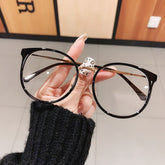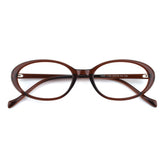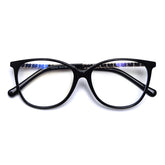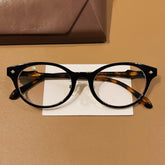What are high index lenses?
Buying prescription glasses can be a daunting task. While finding a frame style that suits your face shape and personal taste might be straightforward, selecting the right lenses involves several critical considerations. Factors such as lens type, usage, index, coatings, and more play a pivotal role in ensuring both comfort and clarity. If you're unsure about how to choose the perfect lenses, you might want to check out our guideline here first. In this blog, we'll delve deep into everything you need to know about lens index to help you make an informed decision.
- What are high-index lenses?
- What are the advantages of high-Index Lenses?
- How to decide which index of lenses you'll need?
1. What Are High-Index Lenses?
High-index lenses are specially designed lenses that are thinner and lighter than regular lenses. They are made from materials with a higher refractive index, which means they can bend light more effectively. This allows high-index lenses to correct vision with less material, making them significantly thinner than standard lenses, even for stronger prescriptions.
In simple terms, if you need a high level of vision correction, high-index lenses offer the same clarity as regular lenses but in a much slimmer and lighter form.
Common High-Index Lens Materials:
- 1.67 Index: Offers a good balance between thinness and durability. Ideal for moderate to high prescriptions.
- 1.74 Index: Even thinner than 1.67, these lenses are perfect for very strong prescriptions but can be more fragile.
- Polycarbonate and Trivex: While not traditionally classified under high-index lenses, they offer lightweight and impact-resistant properties suitable for active lifestyles.
2. What are the advantages of high-Index Lenses?
- Thinner and Lighter Lenses: The main benefit of high-index lenses is that they are thinner and lighter than traditional lenses, offering a more attractive and comfortable option for those with strong prescriptions.
- Improved Appearance: Since high-index lenses are thinner, they reduce the "coke bottle" effect seen with thick lenses, making your glasses look sleeker and more stylish.
- Better Comfort: Lighter lenses put less pressure on the bridge of your nose and ears, making your glasses more comfortable to wear for long periods.
- UV Protection: Many high-index lenses come with built-in UV protection, shielding your eyes from harmful ultraviolet rays.
3. How to decide which index of lenses you'll need?
Choosing the right index for your lenses depends on several factors, including the strength of your prescription, lifestyle needs, and personal preferences. Here’s how to decide which index of lenses you’ll need:
-
Check your prescription and consider the thickness of your lenses:
Compare your Sphere (Sph) and Cylinder (Cyl) values with the table below to find the most suitable lens index for your prescription. The higher the lens index, the thinner and lighter your lenses will be for the same prescription strength. If your prescription is quite strong, choosing a higher lens index can prevent discomfort from heavier lenses, which may put unnecessary pressure on your nose and ears over time.

-
Consider frame selection:
- Thick Frames: If you prefer thicker or full-rimmed frames, you may have some flexibility to choose a lower-index lens. The frame will conceal the lens's thickness, so a 1.50 or 1.56 index lens may still look fine.
- Thin or Rimless Frames: For rimless or thin metal frames, higher-index lenses (1.61 or higher) are recommended because they are thinner and will look better in these lightweight styles.
-
Budget considerations:
Cost vs. Benefits: High-index lenses are generally more expensive than standard lenses. Evaluate the benefits they offer against your budget. Sometimes, investing a bit more upfront can lead to better comfort and longevity.
Insurance Coverage: Check if your vision insurance covers high-index lenses, which can offset the additional costs. -
Consult with an optician:
- Professional Advice: An experienced optician can provide personalized recommendations based on your specific vision needs, prescription, and lifestyle.
- Lens Sampling: Some optical stores offer sample lenses or virtual try-ons to help you visualize how different lens indexes will look with your chosen frames.
High-index lenses are a game-changer for people with strong prescriptions who want thinner, lighter, and more comfortable glasses. They provide excellent vision correction without the bulk of traditional lenses, making them the go-to choice for those looking to combine style with functionality. If you’re ready to upgrade your eyewear, consider high-index lenses for your next pair of glasses!












